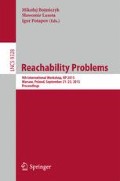Abstract
Interrupt Timed Automata (ITA) form a subclass of stopwatch automata where reachability and some variants of timed model checking are decidable even in presence of parameters. They are well suited to model and analyze real-time operating systems. Here we extend ITA with polynomial guards and updates, leading to the class of polynomial ITA (polITA). We prove that reachability is decidable in 2EXPTIME on polITA, using an adaptation of the cylindrical decomposition method for the first-order theory of reals. Compared to previous approaches, our procedure handles parameters and clocks in a unified way. We also obtain decidability for the model checking of a timed version of CTL and for reachability in several extensions of polITA.
Access this chapter
Tax calculation will be finalised at checkout
Purchases are for personal use only
Preview
Unable to display preview. Download preview PDF.
References
Alur, R., Courcoubetis, C., Dill, D.L.: Model-checking in dense real-time. Information and Computation 104, 2–34 (1993)
Alur, R., Courcoubetis, C., Halbwachs, N., Henzinger, T.A., Ho, P.H., Nicollin, X., Olivero, A., Sifakis, J., Yovine, S.: The algorithmic analysis of hybrid systems. TCS 138, 3–34 (1995)
Alur, R., Dill, D.L.: A theory of timed automata. TCS 126, 183–235 (1994)
Alur, R., Henzinger, T.A., Lafferriere, G., Pappas, G.J.: Discrete abstractions of hybrid systems. Proceedings of the IEEE 88(7), 971–984 (2000)
Asarin, E., Maler, O., Pnueli, A.: Reachability analysis of dynamical systems having piecewise-constant derivatives. TCS 138(1), 35–65 (1995)
Basu, S., Pollack, R., Roy, M.F.: Algorithms in Real Algebraic Geometry. Springer (2006)
Ben-Or, M., Kozen, D., Reif, J.: The complexity of elementary algebra and geometry. In: Proceedings of the Sixteenth Annual ACM Symposium on Theory of Computing, STOC 1984, pp. 457–464. ACM (1984)
Bérard, B., Haddad, S.: Interrupt timed automata. In: de Alfaro, L. (ed.) FOSSACS 2009. LNCS, vol. 5504, pp. 197–211. Springer, Heidelberg (2009)
Bérard, B., Haddad, S., Jovanović, A., Lime, D.: Parametric interrupt timed automata. In: Abdulla, P.A., Potapov, I. (eds.) RP 2013. LNCS, vol. 8169, pp. 59–69. Springer, Heidelberg (2013)
Bérard, B., Haddad, S., Sassolas, M.: Interrupt timed automata: Verification and expressiveness. Formal Methods in System Design 40(1), 41–87 (2012)
Bérard, B., Haddad, S., Picaronny, C., Safey El Din, M., Sassolas, M.: Polynomial interrupt timed automata. CoRR abs/1504.04541, April 2015
Cassez, F., Larsen, K.G.: The impressive power of stopwatches. In: Palamidessi, C. (ed.) CONCUR 2000. LNCS, vol. 1877, pp. 138–152. Springer, Heidelberg (2000)
Collins, G.E.: Quantifier elimination for real closed fields by cylindrical algebraic decompostion. In: Brakhage, H. (ed.) Automata Theory and Formal Languages 2nd GI Conference, vol. 33, pp. 134–183. Springer, Heidelberg (1975)
Grossman, R.L., Ravn, A.P., Rischel, H., Nerode, A. (eds.): HS 1991 and HS 1992. LNCS, vol. 736. Springer, Heidelberg (1993)
Henzinger, T.A., Kopke, P.W., Puri, A., Varaiya, P.: What’s decidable about hybrid automata? J. Comput. Syst. Sci. 57(1), 94–124 (1998)
Hong, H., Din, M.S.E.: Variant quantifier elimination. Journal of Symbolic Computation 47(7), 883–901 (2012)
Lafferriere, G., Pappas, G.J., Sastry, S.: O-minimal hybrid systems. MCSS 13(1), 1–21 (2000)
Miller, D.J.: Constructing o-minimal structures with decidable theories using generic families of functions from quasianalytic classes. ArXiv e-prints 1008.2575, August 2010
Miller, J.S.: Decidability and complexity results for timed automata and semi-linear hybrid automata. In: Lynch, N.A., Krogh, B.H. (eds.) HSCC 2000. LNCS, vol. 1790, pp. 296–309. Springer, Heidelberg (2000)
Müller-Olm, M., Seidl, H.: Computing polynomial program invariants. Inf. Process. Lett. 91(5), 233–244 (2004)
Author information
Authors and Affiliations
Corresponding author
Editor information
Editors and Affiliations
Rights and permissions
Copyright information
© 2015 Springer International Publishing Switzerland
About this paper
Cite this paper
Bérard, B., Haddad, S., Picaronny, C., El Din, M.S., Sassolas, M. (2015). Polynomial Interrupt Timed Automata. In: Bojanczyk, M., Lasota, S., Potapov, I. (eds) Reachability Problems. RP 2015. Lecture Notes in Computer Science(), vol 9328. Springer, Cham. https://doi.org/10.1007/978-3-319-24537-9_3
Download citation
DOI: https://doi.org/10.1007/978-3-319-24537-9_3
Published:
Publisher Name: Springer, Cham
Print ISBN: 978-3-319-24536-2
Online ISBN: 978-3-319-24537-9
eBook Packages: Computer ScienceComputer Science (R0)

